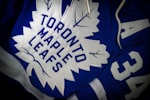"History is written by the victors." - Winston Churchill
(Not everything I write will come from Holzman and Nieforth's Deceptions and Doublecross: How the NHL Conquered Hockey - actually, quite a bit doesn't (save for these last couple of installments) - but it's a good bet that this book will have influenced it. Seriously - go get a copy and read it. It's good. Wikipedia is also your friend.)
----
The NHA governors had made a tactical error in Feb. 1917 when they first evicted Eddie Livingstone. They suspended certain articles of their constitution to permit them to help themselves to Livingstone's players but they only made this active until the end of the season.
The assumption had been, of course, that Livingstone would have sold his interests in the Blueshirts prior to the start of the 1917-18 season. Livingstone, while not dead set against selling his team, was certainly not about to do so on the terms of the other NHA owners and was not about to do so for less than what he deemed to be full value. The new season was approaching fast, Livingstone still owned his team and now the player contracts had all come back to him.
To top it off, the Blueshirts were actually in better shape than most of the other teams. With the war progressing, many teams had lost players to enlistment or to service deferrals. A player who had requested not to join the army could do so for any number of reasons but these all generally left the player unable to play professional hockey. The Blueshirts had most of their roster intact and Livingstone was the most adept of the lot of them at finding amateurs/juniors who could play. Competent players were an extremely valuable commodity and Eddie had a full team's worth. The other teams? Not so much.
The relationship between Livingstone and the other owners was getting no better. His lawsuit for the damages from 1916-17 was still pending and while the other owners continued to demand his removal, he similarly demanded theirs. He made the case (both in public and in private) more than once that the real trouble was being caused by the traditional power brokers in Montreal and Ottawa and he saw no reason why he should give into them.
Further, Livingstone announced that he would pay his players whether the Blueshirts were allowed into the league or not. If his team didn't play a league schedule he was more than happy to take them on a barnstorming tour and make money that way. He also mused about setting up his own league, making use of a number of American cities that had interest in hockey (this wouldn't work prior to war's end, as draft-age men weren't travelling freely across the border). This was not good news to the likes of Sam Lichtenhein who hoped to raid the Blueshirts again.
Livingstone did offer one solution to the problem, though. Historically, when there was serious inter-owner conflict, a group of them would simply form a new league and invite only the teams they got along with. Rumours were abounding that this process would happen again. Livingstone himself had suggested this was coming as early as February. He said that he expected a Toronto entry to be represented in any new league but (and here's the carrot) he would be willing to let someone else run it if this happened.
Livingstone worked out a one-year lease agreement with the Arena Gardens people (despite the fact he was also suing them for holding back the gate receipts from the last Blueshirts game of 1916-17) to manage his team for the season. He would keep his hands off the team for the year and collect a portion of the proceeds once the season was over. Once the other owners verified with the PCHA that any PCHA/NHA draft agreements would carry over the new league became an inevitability.
On November 22, 1917 the new National Hockey League was born. Far from being the sneak attack it has always been portrayed as, Livingstone (and most everyone else) foresaw it and Eddie Livingstone in many ways helped to orchestrate it. NHA president Frank Robinson was more than happy to be done with the ownership group, so the presidency fell to Frank Calder, who had been doing the dirty work for the Montreal and Ottawa owners for some time.
Even with the new league, though, there were still five teams trying to get into a league that was hoping for only four. There were a variety of means by which this could have happened. The Wanderers, hurting at the gate and missing a lot of their players, had floated the idea during the summer/fall of a merger with the Canadiens. The Habs were a lot stronger, though, and had no need of Wanderers owner Lichtenhein taking a share of their profits. This was off the table by November.
The Quebec Bulldogs were also hurting. Their owner wanted to sell (and wasn't finding buyers) and he also had roster issues. The Bulldogs wanted out for that season, but wanted to make sure they got some value for the player contracts they were going to give up. If they simply withdrew, their players would go on the open market and the Bulldogs would get nothing. They instead played a cat-and-mouse game, trying to hide the fact that they wouldn't be playing until they could dispose of their roster. Eventually, it was determined that Quebec would get a fixed fee for each player, the team would sit out the season and owner Mike Quinn would be named to a leadership position with the league.
In Toronto, everything had been on standby until Quebec was sorted out. Once that decision came down, the previously-arranged lease agreement was signed with the Arena Gardens group and they took the Blueshirts lock, stock and barrel for the 1917-18 season. Eddie Livingstone's team would be managed by Toronto sportswriter and Arena manager Charlie Querrie. Eddie would watch from the sidelines.
For all the headaches Livingstone caused the NHA in the summer, the majority of problems in the first season of the NHL were actually caused by the Wanderers and Sam Lichtenhein. The Wanderers were still in trouble in terms of their roster, and before the season even started, Lichtenhein and manager Art Ross made headlines by demanding players from other teams to strengthen their side. They didn't get them.
Six games in, disaster struck. The Wanderers' home rink burned to the ground. Faced with the prospect of taking a 1-5 team cross-town to a much smaller facility, the Wanderers balked. They made one last demand for players, suggesting the entire Quebec roster should be turned over to them. When this was rebuffed, they withdrew. Lichtenhein had gotten a league without Eddie Livingstone, but his own team only survived in it for six games.
The surprise of 1917-18 was that Livingstone's team, managed by Querrie and the Arena Gardens, not only played and drew well but won the Stanley Cup. This generated a lot of money for the arena, and suddenly they were faced with the prospect of not only having to return the whole thing to Eddie Livingstone, but they'd actually have to pony up for the team they'd leased.
They didn't want to do either thing. They'd discovered a cash cow, and wanted to keep it - all of it.
Next - The End Game



